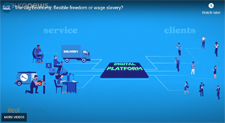Real Economy examines the Gig Economy: flexible freedom or wage slavery?

date: 15/04/2021
It is where individuals provide specific services organised through a digital platform that connects them with clients. This can be a location-based app – allocating jobs such as food delivery, taxi or plumbing services – or web-based platforms that outsource work like translation or graphic design. The platforms are creating new job opportunities. However, there are challenges to ensure good working conditions and that the algorithms treat workers fairly. This new model of platform working has left governments unsure how to regulate it. Spain is the first EU country to pass a law classifying food delivery riders as employees with social protections. Some workers welcome the rights they will gain like unemployment benefits, vacation or sick leave, while others fear that they will lose freedom and flexibility. According to Uma Rani, Senior Economist at the United Nations International Labour Organisation, the problem is “when ‘self-employed’ becomes disguised self-employment where you are an employee, but you're asked to become self-employed and you do not get any of the benefits.” To address such issues and improve the protection of workers on digital platforms, the European Commission has launched a consultation, inviting trade unions and employers' organisations to find agreement. If they cannot, the Commission will draw up legislation by the end of 2021.
